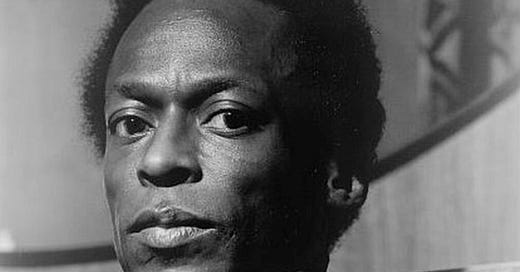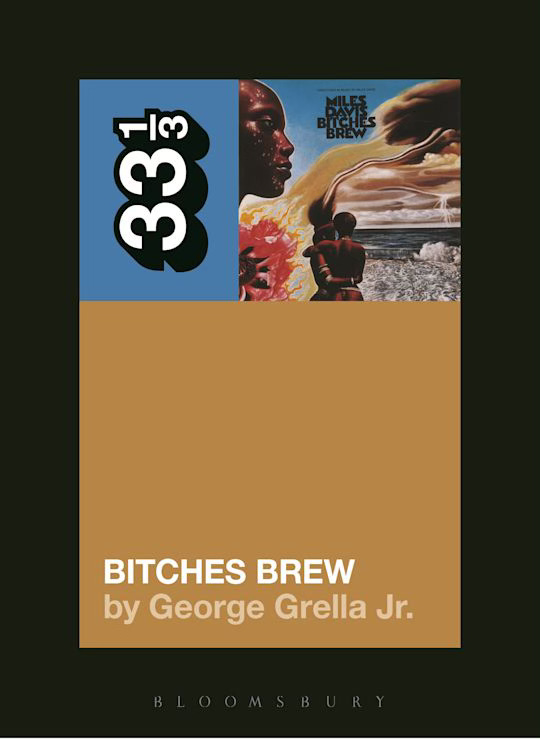In 1964, Dizzy Gillespie ran a joke, publicity stunt campaign for president. He named a lot of his fellow jazz musicians as prospective cabinet picks. He didn’t push it far and was never on any ballot, but he presented a couple interesting metaphorical truths of American society. One was that his supporters named themselves the John Birks Society, and the other was in naming a prospective cabinet that included Charles Mingus as Secretary of Peace (!), Malcolm X as Attorney General (!!), and Miles Davis as the Director of the CIA.
The Bay of Pigs débâcle, the Cuban Missile Crisis, and the Kennedy assassination were in the immediate fabric of society. Republican presidential candidate Barry Goldwater famously said that, “I would remind you that extremism in the defense of liberty is no vice! And let me remind you also that moderation in the pursuit of justice is no virtue!” Miles was not yet known as the “Dark Prince,” but his intimidating and unsentimental cool seem ideal to run an amoral institution that was destabilizing global (and domestic) society, and also failing to even understand both.
Discerning Dizzy saw this, even in jest. Summer of 1964, Miles was five years from recording the forbidding, thrilling music of Bitches Brew, then Jack Johnson, Live-Evil, and beyond. Miles was the guy to overthrow a status quo and create a new establishment. For Bitches Brew, he had a vision and knew the people he needed to make it happen, and crucially got them involved without ever really telling them the goal.
un-Ted Talking
That’s one of unique foundations of the album, and one of the takeaways in this new episode of NPR’s The Sounds of America show. The Library of Congress added Bitches Brew to the National Recording Registry, the second Miles Davis album following Kind of Blue (the complete list of 2025 additions is here, it includes Keith Jarrett’s Köln Concert, Tracy Chapman’s debut album, Hamilton, and Minecraft: Volume Alpha), and the album is the show’s topic. They interviewed myself, Rickey Vincent, Jack DeJohnette, and John McLaughlin. These were separate interviews and I didn’t know who else they were talking with and am absolutely honored by the company, and especially shout out to Vincent, who has written two dynamite books, Funk: The Music, the People and the Rhythm of The One (St. Martin’s Press 1996),and Party Music: The Inside Story of the Black Panthers’ Band (Lawrence Hill Books 2013), add these two your libraries and mine too if you don’t already have it.
Give it a listen, it’s very well put together. I spoke with the producer for about an hour and knew they would edit things down, and I’m impressed with the way they worked from a common set of questions and stitched it all together, with musical context.
https://the1a.org/segments/the-sounds-of-america-bitches-brew/
(NOTE: Corrected the link to the proper Sounds of America segment; the link the site offered to copy was previously incorrect)
One of the questions and answers left on the cutting room floor had to do with Miles’ ability as a bandleader, which was extraordinary in itself. That triggered a thought I had been kicking around for a while, which was about band-leading as leadership, and that is the topic for my May jazz column for the Star-Revue newspapers. Read it there, but the TL;DR starts with these rules distilled from Miles’ career:
Be good at what you do.
Be self-aware.
Have an idea.
Listen.
See talent & think critically.
Don’t be a boss; lead.
Now, very few people are going to be musicians on the level of Miles Davis, but surely there are many, many people with these leadership skills. Unfortunately, very, very few of them are currently in positions of consequential leadership in this country. We have a lot of bosses of small fiefdoms and hardly any leaders. And, fucking here we are.
This is not a search for some secret key for How We Got Here, because there's no secret to the reasons. They've been in plain sight, if not yelled out at excruciating volume, since 1964—and before. That people and institutions in leadership positions have ignored then for sixty years, or thought them trivial, is a failure in line with the incompetence of the CIA, which has never been able to understand the intelligence its gathered. The ability to sell yourself in the public eye is a real one, but that doesn’t mean that you are knowledgeable, imaginative, intelligent, can handle pressure, or even think about anyone other than yourself. Those people are bosses, nothing more.
Bosses could never be jazz musicians—they couldn’t even survive as employees in their own organizations—much less ones at the level of Miles and his bands. Look at the words (reflections of their thinking) they churn out; dull, vapid corporate-speak that does nothing but signify their power and status. Compare that with the lightning-quick thinking of the second Quintet, not just the speed but the coherent articulation of impromptu ideas in the midst of spontaneous consensus building (the social and political framework of jazz, which I wrote about in my February column). And then think of Miles' own constant process toward the ultimate refinement and clarity of his ideas, challenging himself and shedding what no longer mattered to him, while also adapting to and incorporating the changes in the world around him. Sometimes he was led by those, but he was eager to learn about things new to him, then mastered and exceeded them.
Check out this complete set from the second Quintet, shortly after Wayne Shorter joined. This was the band that Miles wanted, in part, because they were moving in directions he didn’t yet fully understand in 1964, but he wanted to.
How many people in leadership positions in politics, at arts institutions, and business would see and hire talent that challenged everything they were doing? Let me take a long pause for my own rueful and sad internal laughter…
Now that I’ve caught my breath, remember this: when Miles had caught up to these young cats and was moving beyond them, they looked to him for leadership. And the challeng was returned: “Play what’s not there” Miles told Herbie Hancock. Be good, do good things, and now, be more.
Good listening to all
Links
Bitches Brew (don’t rent it, buy it)
Miles Davis’ Bitches Brew, my book on the album.
Funk: The Music, the People and the Rhythm of The One, by Rickey Vincent.
Party Music: The Inside Story of the Black Panthers’ Band, and How Black Power Transformed Soul Music, by Rickey Vincent.1
These are Amazon links because that’s what Vincent uses at his site.






Beautiful. And thanks for posting that set from Milan, no idea it existed.